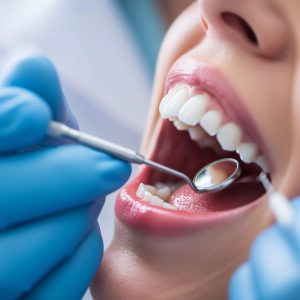A dental extraction (also referred to as exodontia) is the removal of a tooth from an individual’s mouth. Extractions are typically performed for a wide variety of reasons (both cosmetic and health-related), including tooth decay that has destroyed a sufficient amount of the tooth’s structure to render the tooth beyond restoration. The extraction of wisdom teeth is commonly performed in order to prevent their impact into other teeth, as is the extraction of healthy teeth to create room for orthodontic procedures.
“Before removing your tooth, your dentist will give you a local anesthetic to numb the area where the tooth will be removed. A stronger, general anesthetic may be used, especially if several or all of your teeth need to be removed. General anesthetic prevents pain in the whole body and will make you sleep through the procedure.
After the tooth is removed, you may need stitches. You can gently bite down on a cotton gauze pad placed over the wound to help stop the bleeding. The removed tooth can be replaced with an implant, a denture, or a bridge. A bridge is a replacement for one or more (but not all) of the teeth and may be permanent or removable.
What To Expect After Surgery
In most cases, the recovery period lasts only a few days. The following will help speed recovery:
- Take painkillers as prescribed by your dentist or oral surgeon. Apply an ice or cold pack to the outside of your mouth to help relieve pain and swelling.
- After 24 hours, rinse your mouth gently with warm salt water several times a day to reduce swelling and relieve pain. Make your own salt water by mixing 1 tsp (5 g) of salt in a medium-sized glass [8 fl oz (240 mL)] of warm water.
- Change gauze pads before they become soaked with blood.
- Relax after surgery. Physical activity may increase bleeding.
- Avoid smoking.
- Eat soft foods, such as gelatin, pudding, or a thin soup. Gradually add solid foods to your diet as healing progresses.
- Do not lie flat. This may prolong bleeding. Prop up your head with pillows.
- Avoid rubbing the area with your tongue.
- Do not use sucking motions, such as when using a straw to drink.
- Continue to carefully brush your teeth and tongue.
After the tooth is removed, you may need stitches. Some stitches dissolve over time, and some have to be removed after a few days. Your dentist will tell you whether your stitches need to be removed.
Why It Is Done
Removing a tooth is necessary when decay or an abscessed tooth is so severe that no other treatment will cure the infection.
How Well It Works
Removing the tooth can help keep infection from spreading to other areas of your mouth.
Risks
Some dental work can cause bacteria in the mouth to enter the bloodstream and cause infections in other parts of the body. People who have a hard time fighting off infections may need to take antibiotics before and after dental surgery. You may need to take antibiotics if you:
- Have certain heart problems that make it dangerous for you to get a heart infection called endocarditis.
- Have an impaired immune system.
- Had recent major surgeries or have man-made body parts, such as an artificial hip or heart valve.
After an extraction, a blood clot forms in the tooth socket. The clot protects the bone while the healing process takes place. If that blood clot is loosened or dislodged, you may have a dry socket, in which the bone is exposed. Dry sockets may last for several days and may cause severe pain that sometimes includes ear pain.
What To Think About
A tooth extraction should be done as soon as possible to avoid the spread of infection and more serious problems. In cases in which a root canal treatment might not save the tooth, your dentist may recommend that the tooth be removed and a bridge or implant installed.
Smoking or using spit tobacco delays healing and reduces your ability to fight infection in your gums. So to heal well after your surgery, it’s best to stop all use of tobacco. If you do smoke, the sucking motion of inhaling may loosen or dislodge the blood clot that is important for healing.”
(WebMD)

